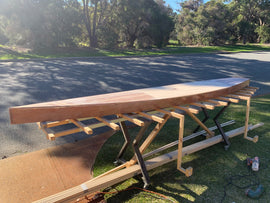Don't let an uninformed fear of epoxy hold you back from building your own classic wooden paddle board!
I'll admit before I started my first board I was a bit nervous about using epoxy, primarily because it can get messy very quickly if you get it wrong... but then I started looking into the possible health impacts. For starters I used only high quality low VOC resins and stayed well away from polyester resin, that stuff is nasty! Plus poly resins have an inferior bond compared to epoxy and poly resin has a much higher water absorption rate.
Do yourself a favour and search "plant based epoxy resin" and you'll find there's a better alternative!
But now 5 years into making and designing wooden sups I'm starting to see plenty of data to suggest that plant based epoxy resin is just as strong as conventional petroleum based resin but without any of the side effects such as smell and environmental impact.

When it comes to the health benefits, plant-based epoxy resins for wooden surfboards offer several advantages over petroleum-based epoxy resins.
Here are the key differences:
1. Reduced Volatile Organic Compounds (VOCs):
Petroleum-based epoxy resins can release volatile organic compounds (VOCs) during the curing process. VOCs are chemicals that can vaporize and be released into the air, potentially causing respiratory irritation and other health concerns. Common VOCs found in petroleum-based resins include styrene, toluene, and formaldehyde.
In contrast, plant-based epoxy resins typically have lower VOC emissions. They are often formulated to minimize or eliminate the use of harmful chemicals, resulting in a reduced risk of indoor air pollution and associated health effects.
2. Allergen Reduction:
Some individuals may be sensitive or allergic to certain chemicals found in petroleum-based epoxy resins. For example, styrene, a commonly used component in traditional epoxy resins, has been known to cause skin irritation, respiratory problems, and allergic reactions in some people.
Plant-based epoxy resins offer a potential solution for individuals with sensitivities or allergies. By using natural and renewable materials, such as soy or corn oils, plant-based resins can reduce the likelihood of triggering allergic reactions or skin sensitivities.
3. Biocompatibility:
Plant-based epoxy resins are generally considered more biocompatible than their petroleum-based counterparts. Biocompatibility refers to the compatibility of a material with living tissues or organisms. Plant-based resins are often derived from natural sources, which makes them more compatible with the environment and potentially less harmful to human health.
4. Safer Manufacturing and Handling:
The production of plant-based epoxy resins can involve less toxic chemicals and hazardous materials compared to petroleum-based resins. This not only benefits the environment but also reduces the risks associated with handling and manufacturing processes.
Furthermore, the potential health risks for workers involved in the manufacturing and application of plant-based resins may be lower due to reduced exposure to harmful substances. This can contribute to a healthier and safer working environment.
It's important to note that while plant-based epoxy resins offer potential health benefits, it's always advisable to follow proper safety precautions when working with any type of epoxy resin, including wearing appropriate personal protective equipment and ensuring good ventilation.
So... I'm sold!
Plant-based epoxy resins for wooden surfboards provide health benefits by reducing VOC emissions, minimizing allergenic substances, offering better biocompatibility, and promoting safer manufacturing and handling practices. These advantages make them a desirable option for those seeking a healthier and more environmentally friendly alternative to traditional petroleum-based epoxy resins.






















